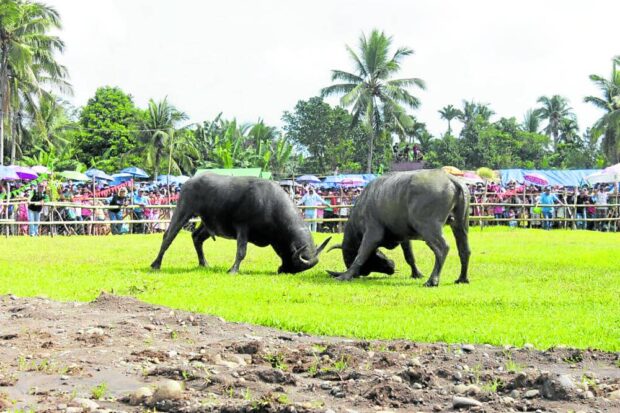Leyte town halts festival, cites law vs animal cruelty

STOP THE FIGHT | The Turogpo Festival, featuring carabao and horse fights, is a Black Saturday tradition anticipated by residents of Carigara, Leyte. The local government, however, has decided not to revive the event due to concerns about animal cruelty. (Photo from the Facebook page of Carigara)
TACLOBAN CITY, Leyte, Philippines — Good news for animal lovers. There will be no carabao or horse fights on Black Saturday in the town of Carigara in Leyte province this year.
Canceled in 2020 and 2021 because of the COVID-19 pandemic, the highly anticipated Turogpo Festival would not push through because of a law prohibiting animal cruelty.
“Of course, we are sad because Turogpo Festival is part of Carigara’s tradition, especially during Black Saturday. But we cannot do anything about it because there is a law protecting our animals like carabaos,” Councilor Joenlee Larraga said in a phone interview over the weekend. “We have to respect the law.”
Carigara Mayor Eduardo Ong Jr. said that a Mass and short program would be held instead. “Our municipality will be celebrating this year’s Turogpo in a simpler way that will be just as meaningful,” he added.
The local government cited Republic Act No. 10631, otherwise known as the Animal Welfare Act of 1998, in its decision to call off the festival. Under the law, any person who subjects any animal to cruelty, maltreatment or neglect shall, upon conviction by final judgment, be punished by imprisonment and/ or a fine based on the court’s discretion.
Article continues after this advertisementCarabao, horse matches
While RA 10631 was amended only in 2013, the regulatory division of the Department of Agriculture in Eastern Visayas received some reports and concerns about the Turogpo Festival, prompting the local government to cancel the event.
Article continues after this advertisementTurogpo originates from a Waray term that means to meet or match. The first festival was held 400 years ago as a subtle form of protest by Filipinos against the Spanish government.
It involves pitting carabaos or water buffalos against each other by making them lock horns, or making stallions or male horses fight over a mare. Local officials award cash prizes to the owners of the winning animals with spectators also placing bets.
The event used to be held on Good Friday but was moved to Black Saturday in 1983 upon the request of then-Archbishop Cipriano Urgel who did not want parishioners to be distracted from observing Christ’s suffering and death on Good Friday.
Larraga said that they tried to get the support of the Department of Tourism and even the Leyte provincial government to promote the festival as a tourist attraction. But their request was turned down because of the law against animal cruelty.